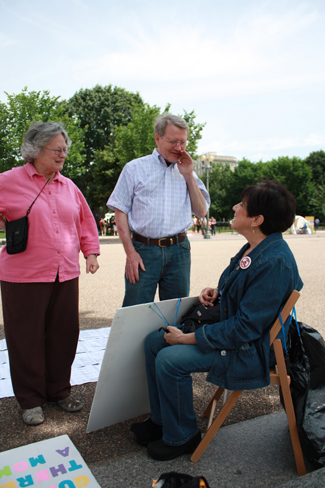
WASHINGTON, D.C. — The streets of downtown Washington, D.C. were busy with tourists and parade-goers on a day when the nation remembers and honors its fallen soldiers.
Standing outside the north lawn of the White House, as tourists and throngs of Boy Scout troops passed by, a small but devoted group of citizens were calling upon Congress to pass gun control legislation. The demonstrators, many of whom are retired school teachers and public health workers from the Washington, D.C. metro area, held or wore signs listing statistics about mass shootings or urging Congress to ban assault weapons and high capacity magazines.
The demonstration was organized by retired high school principal Linda Finkel-Talvadkar who, along with anywhere from three to 50 others, has converged on the White House every Monday for the last nine months.
Talvadkar and some friends began their protests shortly after the movie theater shootings in Aurora, Colo. Their purpose is not to eliminate guns, she said, but to ensure that those who have guns “learn how to handle and house them safely and not to jeopardize those around them.”
Talvadkar has worked closely from the start with Barbara Elsas and Helen Ramsey to spear head this effort. The group has no name and no formal organization, and they plan to keep it that way, she said. We are just concerned citizens, she explained, “seeking to make change[s] in a culture of violence where our most precious youth are the innocent victims.”

At each demonstration, the participants, many of whom are mothers and grandmothers, stand outside the White House and, for two hours talk with those who pass by about gun safety, gun violence prevention and gun control legislation, said Talvadkar.
Many organizations have joined Talvadkar and her colleagues; including the Brady Campaign, the Coalition to Stop Gun Violence, as well as parents of victims of the Virginia Tech shooting, she said.
On Memorial Day, one of those demonstrators was Jan Fenty, a Washington, D.C. resident, mother, grandmother and retired elementary school teacher. “This is my fourth week coming out,” Fenty said. With so many people being killed, even children killing children, day after day, she explained, she felt she had to do something.
People who come to the White House and to Washington, D.C., she believes, “are encouraged that the people of D.C. are taking a position” on gun control. In fact, by her estimation, “approximately three out of four [people she has spoken with] support our positions.” And even those they speak with who don’t agree with their stance on gun control, including several members of the NRA, have been gracious and willing to listen and discuss the issues.
By talking with interested citizens, Talvadkar, Fenty and the other demonstrators hope to educate and change people’s minds. And ultimately they hope Congress will pass “common sense” legislation on gun control, said Talvadkar. They hope federal legislation will reinstate the assault weapons ban, ban high capacity ammunition magazines and require universal background checks before gun sales, said Talvadkar.
In April, the Senate failed to pass gun control legislation. A Pew Research Center poll released last Thursday — surveying 1,504 adults in the first week of May — found that 50 percent of Americans believe it’s important to control gun ownership while 49 percent think it’s more important to protect the rights of gun owners.
 The same PRC poll, however, also found that the majority of the American public, like Talvadkar and her fellow demonstrators, support gun control measures, such as background checks for private and gun show sales. And almost three-quarters of Americans, the PRC poll found, say they support a reintroduction and passage of the gun control bill in Congress.
The same PRC poll, however, also found that the majority of the American public, like Talvadkar and her fellow demonstrators, support gun control measures, such as background checks for private and gun show sales. And almost three-quarters of Americans, the PRC poll found, say they support a reintroduction and passage of the gun control bill in Congress.
Yet despite the support of those at the demonstration and the majority of Americans, most are pessimistic about the prospect of new legislation. Fifty six percent of the public believes it’s unlikely that Congress will pass any significant gun control legislation this year, according to the PRC poll.
Talvadkar, however, remains hopeful. “I think the bill will get re-introduced . . . and I think a modified version of background checks will get passed,” she said. “But the conversation has to continue and the pressure has to continue…we have to give [Congress] the courage to speak out,” she added.
“We intend to continue our demonstration until the legislation that will ensure the safety of our citizens is passed,” said Talvadkar. “Our demonstrations may be symbolic in nature,” she said, but she believes that they “have measurably changed some people’s minds on this issue.”
Photo captions: Demonstrators wear signs and speak to passerbys outside the White House on Memorial Day (top two); Linda Finkel-Talvadkar, demonstration organizer, speaks with other demonstrators outside the White House on Memorial Day (bottom).
Photo credit: Jessica Kendall for Youth Today.





























